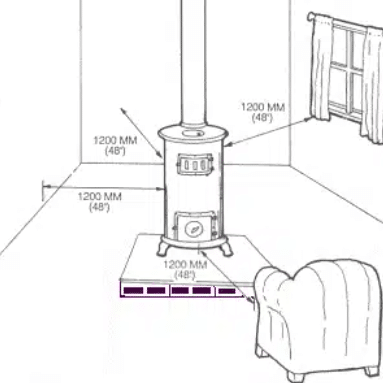A WETT certificate is an important document that provides assurance of the safety and compliance of wood-burning systems, such as fireplaces and wood stoves. This certification is crucial for homeowners, real estate agents, and insurance companies to ensure the proper installation and maintenance of these heating appliances. Understanding the importance of a WETT certificate and its role in promoting safety is essential for anyone who owns, or is considering purchasing a wood-burning system.
On This Page
Understanding the WETT Certificate
The WETT certificate, which stands for Wood Energy Technology Transfer, is a document that verifies the compliance of wood-burning systems with the applicable building codes and safety standards. It is issued by WETT-certified professionals who have undergone specialized training and have the knowledge and expertise to assess the safety and functionality of wood-burning appliances.
A WETT certificate is an official document that confirms the compliance of wood-burning systems with the relevant codes and standards. It is issued after a thorough inspection by a WETT-certified professional.
The Purpose of a WETT Certificate
The primary purpose of a WETT certificate is to ensure the safe use and operation of wood-burning systems. It provides peace of mind to homeowners and potential buyers that the appliance has been properly installed, meets safety requirements, and poses no harm to the property or its occupants. Additionally, insurance companies often require a valid certificate to provide coverage for wood-burning systems.
During the inspection process, WETT-certified professionals thoroughly examine the wood-burning system, including the chimney, stove, and any other components. They assess the overall condition, check for any potential hazards, and ensure that the system meets all necessary requirements.
Furthermore, a WETT-certified inspector will evaluate the clearance distances between the wood-burning appliance and surrounding combustible materials. This is crucial to prevent the risk of fire caused by heat transfer to nearby walls, floors, or furniture. By ensuring that the appliance is installed at a safe distance, the WETT certificate provides peace of mind and minimizes the potential for accidents.

One of the key benefits of obtaining a WETT certificate is that it provides documentation of compliance. This can be especially important for homeowners who plan to sell their property in the future. A valid certificate can increase the marketability of a home, as it assures potential buyers that the wood-burning system has been inspected and is in good working order.
Insurance companies also recognize the importance of WETT certification. They often require a valid certificate to provide coverage for wood-burning appliances. This is because a properly installed and maintained system reduces the risk of fire and other potential hazards. By ensuring that homeowners have a WETT certificate, insurance companies can have confidence in the safety of the property. Insurance providers may offer discounts or incentives for having a valid certificate, as it demonstrates that the homeowner has taken steps to reduce the risk associated with wood-burning systems.
Overall, the certificate plays a crucial role in promoting the safe and responsible use of wood-burning systems. It provides homeowners with peace of mind, enhances property value, and ensures that insurance coverage is in place.
Legal Requirements
In many jurisdictions, having a valid certificate is a legal requirement for the installation and operation of wood-burning appliances. Failure to comply with these regulations can result in fines and other legal consequences. Therefore, homeowners should ensure they have a WETT certificate to comply with local bylaws, fire retrofit requirements, and building codes.
Moreover, a certificate can be beneficial when it comes to insurance claims. In the unfortunate event of a fire or other wood-burning appliance-related incident, having a valid certificate can help ensure a smoother claims process. Insurance companies are more likely to process claims efficiently when homeowners can demonstrate that their wood-burning system was installed and maintained in accordance with safety guidelines.
Process of Obtaining a Certificate
Acquiring a WETT certificate involves several steps and must be performed by a qualified WETT-certified professional who has the necessary expertise to conduct the inspection and issue the certificate.
Who Can Issue a WETT Certificate?
Only individuals who have completed the WETT certification training and hold a valid WETT certification can issue a WETT certificate. These professionals possess the knowledge and skills to assess wood-burning systems for compliance with safety standards and building codes.
A WETT certificate typically has a validity period, which may vary depending on local regulations and insurance requirements. After the certificate expires, homeowners may need to arrange for a new inspection and obtain a renewed certificate.
The cost of obtaining a certificate can vary depending on several factors, including the complexity of the wood-burning system and the region. Homeowners should contact WETT-certified professionals in their area for a quote and specific pricing information.
By understanding the importance of a WETT certificate and the role it plays in ensuring the safety and compliance of wood-burning systems, homeowners can make informed decisions when it comes to the installation and maintenance of these appliances. A valid certificate not only provides peace of mind but also satisfies legal requirements and insurance obligations, making it an essential document for wood-burning system owners.
